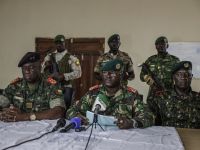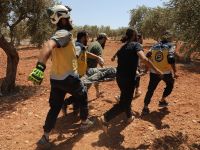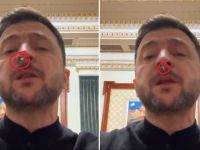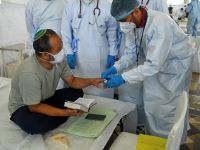The leader of the Iraqi al Wifaq party, Eyad Allawi, asserted in a telephone interview with Albawaba.com that the Iraqi opposition factions do not desire to see American forces deployed on Iraqi soil. Additionally, Allawi talked about Saddam Hussein’s plans to strike some Arab countries in an attempt to deter them from participating in any action against Iraq. The following are excerpts from the interview with Allawi:
Q. The US national security advisor, Condoleezza Rice, asserted that the American administration had no other option but to topple Saddam. How would you perceive this assertion and has it added anything to the results of your recent Washington meeting?
A. The American administration and the Congress decision centers have definitely reached a consensus regarding the Iraqi issue - they cannot live with Saddam. Consequently, they have taken a decision to support the Iraqis to get rid of Saddam and if they fail to do so the US will attack the regime in order to help the Iraqi people topple him.
The meetings held in Washington and the statements issued after them have all come within the framework of the American orientation which has become very obvious.
Q. You have discussed with the Americans a number of issues related to the change process in Iraq and you stressed on the role of the Iraqi opposition in this process. To what extent do the Americans accept your proposals?
A. Frankly, we all felt in our meetings at the US Foreign Department and with the US Defense Minister, chief of staff and vice president complete understanding for the opposition demands to support democracy in Iraq after the present regime is ousted.
The US officials were dealing with the Iraqi opposition leaders as partners and future officials after the change in Iraq is achieved. This depicts the American recognition that Iraqis like other Arabs are committed to their sovereign will and national decision.
Q. The leader of Kurdistan National Union Party, Jalal al Talbani, denied in a recent interview with Albawaba.com that he requested the Americans to deploy forces in the Iraqi Kurdistan but he confirmed that he requested a US protection against chemical and biological weapons and foreign interference. As leader of Wifaq party, what is your stance towards the deployment of such forces whether in northern Iraq or any other part of the country?
A. In fact the issue of deployment of forces has never been discussed. Our discussions were focused on two aspects: supporting the Iraqi people and their national factions and protection of the Iraqi people, rebellions and other Arab countries against Saddam’s avenge. At this point I would like to remind everybody of the events that took place after the 1991 uprising in Iraq when the Americans allowed Saddam’s regime to use military helicopters. The rebellions who controlled most of the Iraqi districts at that time faced an assault by the helicopters which fired rockets at them, the fact that resulted in massacres among these people.
Now, there is a similar fear that Saddam may use chemical weapons in his attack against rebels. We as opposition requested the US to provide us with protection and in our opinion this protection should be from the air and monitoring through the satellites rather than deployment of ground forces on the Iraqi soil. Practically, the deployment of ground forces whether in KurdIstan or any other part of Iraq will not be useful. The forces to be deployed cannot protect themselves if Saddam decides to strike against them with weapons of mass destruction. We as opposition do not desire to see American forces deployed in Iraq but rather ask the US to protect the Iraqi people when they rebel against Saddam whether they were civilians or military people.
Q. Many Arab countries announced officially their rejection of any military action against Iraq. Have you felt through your contacts with Arab officials that there was opposition to toppling Saddam by Iraqis with foreign assistance?
A. I think there is a problem among the Arabs in understanding what the US intends to do. Through our dialogues with the US officials we recognized that they would not attack Iraq and so we tried to convey this information to our Arab brothers whom we met. Iraq will not be attacked like what happened in 1991 and if there were military attacks they would be limited to certain sites including Saddam, leadership and control headquarters. There will not be any attacks on the infrastructure, military or any other governmental establishments.
It seems to me that some Arab countries did not understand the issue like that. Arab countries have the right to be afraid of a possible full-scale war near their borders, but I would like to reassure them that such a war wouldn’t break out. After the US diplomacy has taken its final decisions in its meetings with the Iraqi opposition, it seems to me that they will finalize the affair and explain it to all other Arab countries particularly those with common borders with Iraq.
Q. Baghdad has been threatening to launch massive retaliation against any military action and against you as opposition. How do you look at this and do you consider it as the last breath out for the Iraqi regime?
A. I think it is the last breath out for the regime which currently constitutes an enemy to the US, Europe, the international community and the Iraqi opposition. The Iraqi officials feel now that there is turbulence within their agencies and power centers inside Iraq. We as an opposition movement have been observing through our advanced monitoring sites a state of tension and collapse within the regime’s important agencies over the past few weeks, the fact that confirms the difficult and turbulent circumstances which the regime faces at present.
In order to consolidate itself, the Iraqi regime reverted to stepping up of actions against the opposition and some Arab states. This escalation may reach a stage during which Saddam will launch strikes and terrorist actions against some Arab countries.
Some security service men who fled Iraq and joined us have recently told us that such plans were ready and in our turn we would like to notify the Arab states of this information. If the Arab officials desire to meet these security officials we can arrange a meeting between all parties so that the Arab countries will be aware of the conspiracies of the regime against the whole region.
Q. You played an effective role in bringing together the various Iraqi opposition factions and made big efforts in that respect during the G-6 discussions with the Americans. Do you think now that the G-6 will be able to unite all the opposition sides? What about the opposition conference which will be held soon?
A. It has been agreed to hold the conference by the end of September 2002 and it may be held early October. A preparatory committee from the six sides has been formed and will meet soon in London to discuss all issues to be tackled by the conference. An important meeting will also be held to include major opposition factions that have common political vision and faith in democracy and a federation system in Iraq that will cooperate with the region’s states and be a positive part of the international community.
Additionally, the conference will come in coordination with our Iraqi people and military forces inside Iraq and not merely by the opposition outside the country. This, in our opinion, constitutes a major step forward in the Iraqi joint action by all the opposition factions inside as well as outside Iraq. (Albawaba.com)







